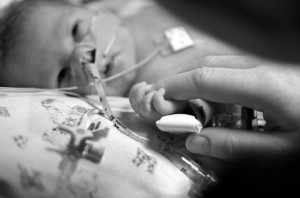Delivery Room Negligence Alleged in Wrongful Death Claim
 In a newly-filed birth injury lawsuit, a New Jersey couple is alleging that a series of negligent acts and omissions on the part of labor and delivery staff attending the birth of their son ultimately resulted in his death soon afterward.
In a newly-filed birth injury lawsuit, a New Jersey couple is alleging that a series of negligent acts and omissions on the part of labor and delivery staff attending the birth of their son ultimately resulted in his death soon afterward.
The highly detailed complaint argues that the physicians and staff treating the expectant mother failed to address the numerous risk factors her pregnancy presented, botched labor induction attempts, failed to adequately monitor changes in the fetus and did not call for timely delivery via Caesarian section.
Numerous acts and omissions cited in complaint
The plaintiff in this case began receiving prenatal care in early 2013 for a pregnancy which quickly presented a series of risk factors and complications. Among these were pregnancy-induced hypertension, polyhydramnios, large fetus for gestational age, obesity and gestational diabetes. On September 30 of that year, she was admitted to the hospital for labor induction. An initial attempt at cervical ripening failed, and the plaintiff was sent home with the instruction to return on October 6 for a second attempt.
The plaintiff returned on that date, at which point another similar attempt at cervical ripening failed. Attending physicians determined that fetal monitoring would continue, though issues with monitoring equipment continued to plague the process. Induction drug Pitocin was introduced, though progress remained slow. During an internal exam, one of the attending physicians artificially ruptured the patient’s membranes, though there was ongoing uncertainty among other staff if and/or when it actually occurred, adding confusion to the proper course of action to take with regard to further induction methods.
After hours and hours marked by significant lack of progress and attempts at conventional labor, a C-section was eventually ordered. Upon delivery, the infant boy presented signs of meconium aspiration for which a Code Blue was called. The child had startlingly low Apgar scores, was intubated and had weak femoral pulses and no movement of his extremities. Upon admission to the NICU, the child received diagnoses of neonatal encephalopathy, suspected sepsis, suspected chorioamnionitis, seizures and severe metabolic acidosis.
The infant was transferred to another hospital via helicopter for more specialized hypothermia treatment, though he suffered convulsions, persistent respiratory failure, and acute kidney failure. An October 11 EEG revealed no brain activity. The plaintiff mother and father made the decision to remove all life support, and the child died soon afterward.
Hypoxic ischemic encephalopathy cited as cause of death
According to the infant’s death certificate, he died of acute respiratory distress syndrome, hypoxic ischemic encephalopathy and sepsis. The plaintiffs now allege that continuous negligent acts and omissions on the part of the attending medical staff resulted in their child’s death. They assert that neglect of obvious maternal and fetal risk factors, the subjecting of the fetus to a prolonged, protracted and traumatic labor of nearly three days and improper use of Pitocin and other induction drugs caused the infant to suffer hypoxic injuries from which he could not recover.
Parents seek monetary damages
As a result of the negligence alleged in the complaint, the mother and father of the deceased infant are seeking a damage award to include hospital and medical expenses, loss of earnings, lost earning capacity, loss of enjoyment as well as pain and suffering experienced following the child’s death. They are also pursuing damages stemming from alleged negligent infliction of emotional distress resulting from the carelessness of the defendants in this action.
- Medscape, Hypoxic-Ischemic Encephalopathy, www.emedicine.medscape.com/article/973501-overview#a1
- American College of Obstetricians and Gynecologists, Study Finds Adverse Effects of Pitocin in Newborns,http://www.acog.org/About-ACOG/News-Room/News-Releases/2013/Study-Finds-Adverse-Effects-of-Pitocin-in-Newborns


 Resources
Resources
 Resources
Resources
